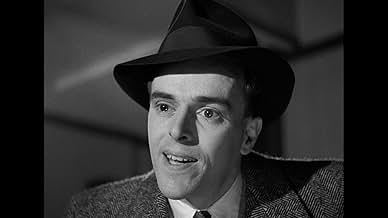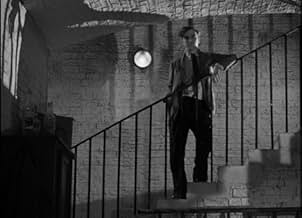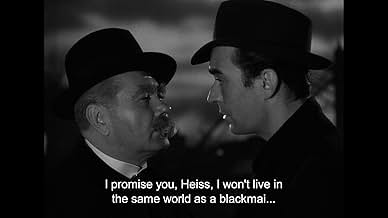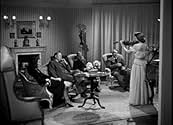NOTE IMDb
6,6/10
479
MA NOTE
Ajouter une intrigue dans votre langueIn Britain, a man with a shady past uses his antiquities shop as a front for smuggled diamonds but his young shop-assistant starts blackmailing him, leading to murder and to a police investi... Tout lireIn Britain, a man with a shady past uses his antiquities shop as a front for smuggled diamonds but his young shop-assistant starts blackmailing him, leading to murder and to a police investigation.In Britain, a man with a shady past uses his antiquities shop as a front for smuggled diamonds but his young shop-assistant starts blackmailing him, leading to murder and to a police investigation.
- Réalisation
- Scénario
- Casting principal
Arthur Dibbs
- Man at Auction
- (non crédité)
Diana Dors
- Mildred
- (non crédité)
Sam Harris
- Pubber
- (non crédité)
Katie Johnson
- Music Box Seller.
- (non crédité)
Vi Kaley
- Flower Seller
- (non crédité)
David Keir
- Gentleman Customer
- (non crédité)
James Knight
- Publican
- (non crédité)
Eliot Makeham
- Usher At Concert Hall
- (non crédité)
Avis à la une
I expected this movie to be oldfashioned in acting style with an easy plot. Instead it surprised me with a fairly complex plot and some actions by the characters I did not foresee. Most important, I thought the acting style of Homulka was extremely "real," and he did not sound like he was speaking lines. Take yourself back to the 30s --which is what it looked like, even if it is 1947, and enjoy.
This film has an excellent cast.Kenneth Griffiths being very nasty as the blackmailing Archie.Gary Marsh being his usual jovial policeman.Bits from Kathleen Harrison and Irene Handel.However towering over them all is Oscar Hamolka and his expressive eyebrows.He steals every scene he is in,not just in this film but every film he appeared in.His is an excellent performance which keeps the film going after the murder of Archie.However the film does rely on an unlikely contrivance to bring the film to its slightly tame ending.What on earth was Irene Handel doing wandering around in the woods late at night?Due to her presence the murder eventually unravels.
This is a most enjoyable film classic in the vintage 1940s tradition. The opening segment, as the credits fade out against the backdrop of a cold, dark, night correlate with the sense of mystery and intrigue suggested in the title. There's something warm and inviting, here for the aficionado.
Although shot in 1947, the film has a familiar Dickensian feel to it; there's the antique store that features as the central setting (shades of "The Old Curiosity Shop"), there's Kenneth Griffith who lurks ominously like Uriah Heep (from "David Copperfield" and Kathleen Harrison, that perennial favourite, is the archetypal Victorian housekeeper. Muriel Pavlow's character, although not fully explored, has some resemblance to a Dickensian heroine.
Thickly moustachioed, Oskar Homolka (cigar-puffing, piercing eyes and busy eyebrows), in the role of protagonist, delivers a masterful performance (can one ever forget him after watching him in whichever role he plays?). He and Griffith are the driving forces that propel this absorbing drama. For one relatively new to acting, Griffith delivers a convincing performance. Beneath the superficial layer of criminal activity, the film goes deeper to touch on, among other issues, the nature of evil which in Griffith's case appears to be an inherent trait. In the case of Homolka: is he a tragic figure, does he evoke a sense of pathos, does he earn our sympathy? These are some of the questions which the view faces at the film unfolds.
The 1940s was the highpoint in British cinema and it's not difficult to see why this film is so highly rated in the canon.
PS: If you are a lover of classical music, you will enjoy a bonus!
Although shot in 1947, the film has a familiar Dickensian feel to it; there's the antique store that features as the central setting (shades of "The Old Curiosity Shop"), there's Kenneth Griffith who lurks ominously like Uriah Heep (from "David Copperfield" and Kathleen Harrison, that perennial favourite, is the archetypal Victorian housekeeper. Muriel Pavlow's character, although not fully explored, has some resemblance to a Dickensian heroine.
Thickly moustachioed, Oskar Homolka (cigar-puffing, piercing eyes and busy eyebrows), in the role of protagonist, delivers a masterful performance (can one ever forget him after watching him in whichever role he plays?). He and Griffith are the driving forces that propel this absorbing drama. For one relatively new to acting, Griffith delivers a convincing performance. Beneath the superficial layer of criminal activity, the film goes deeper to touch on, among other issues, the nature of evil which in Griffith's case appears to be an inherent trait. In the case of Homolka: is he a tragic figure, does he evoke a sense of pathos, does he earn our sympathy? These are some of the questions which the view faces at the film unfolds.
The 1940s was the highpoint in British cinema and it's not difficult to see why this film is so highly rated in the canon.
PS: If you are a lover of classical music, you will enjoy a bonus!
Oskar Homolka is an antiques dealer with a daughter, Muriel Pavlow, who is studying to be a concert violinist. He is well respected and kindly, with a wide circle of friends that includes Derek Farr, a Royal Navy surgeon who brings him oddities from across the world. Farr is in love with his daughter. His other friends in Garry Marsh, at Scotland Yard, and Manning Whitley, a burglar from whom he buys stolen goods. He tells Whitley he's getting out of that line of business; he understands Whitley's disappointment, but he worries about public exposure, since he's wanted in France for having escaped from Devil's Island for murder. They part on good terms. However, Homolka's shop assistant, Kenneth Griffith, has overheard the conversation and begins to blackmail Homolka.
It's produced and directed by George King, best known as a director of cheap quota quickies in the 1930%, who had a lot of success directing Tod Slaughter n old-line melodramas. In the 1940s, King's star rose, and he was in charge of some fine programmers.
This one is in line with the melodramas he had directed in the previous decade. So long as he is concentrating on Homolka, it is a first-rate character study of a kind man under pressure. In the final third, he falls back into some of his habits as a director of cheap movies, most obviously during a car chase sequence.
Still, it's mostly a fine movie, almost entirely due to Homolka, and a pleasure to watch.
It's produced and directed by George King, best known as a director of cheap quota quickies in the 1930%, who had a lot of success directing Tod Slaughter n old-line melodramas. In the 1940s, King's star rose, and he was in charge of some fine programmers.
This one is in line with the melodramas he had directed in the previous decade. So long as he is concentrating on Homolka, it is a first-rate character study of a kind man under pressure. In the final third, he falls back into some of his habits as a director of cheap movies, most obviously during a car chase sequence.
Still, it's mostly a fine movie, almost entirely due to Homolka, and a pleasure to watch.
This was best known as Diana Dors' first movie. Though she is not in the credits, crowds of her admirers turned out to see it. The plot twists and turns were so surprising, never quite what I guessed might have happened. Holmolka's performance is very realistic rather than a costumed caricature. Dors steals the show with her nasty wiggle walk through about four scenes and less than 10 minutes of film.
Le saviez-vous
- AnecdotesThis was Diana Dors' first film.
- GaffesDescius Heiss is supposed to be French, although the name is not French, and Oscar Homolka does not use a French accent.
- ConnexionsFeatured in Diana Dors: Britain's Blonde Bombshell (2022)
- Bandes originalesAve Maria
(uncredited)
Music by Franz Schubert
Arranged by George Melachrino
Performed by Frederick Grinke (solo violin)
Meilleurs choix
Connectez-vous pour évaluer et suivre la liste de favoris afin de recevoir des recommandations personnalisées
- How long is The Shop at Sly Corner?Alimenté par Alexa
Détails
- Durée
- 1h 31min(91 min)
- Couleur
- Mixage
- Rapport de forme
- 1.37 : 1
Contribuer à cette page
Suggérer une modification ou ajouter du contenu manquant
































